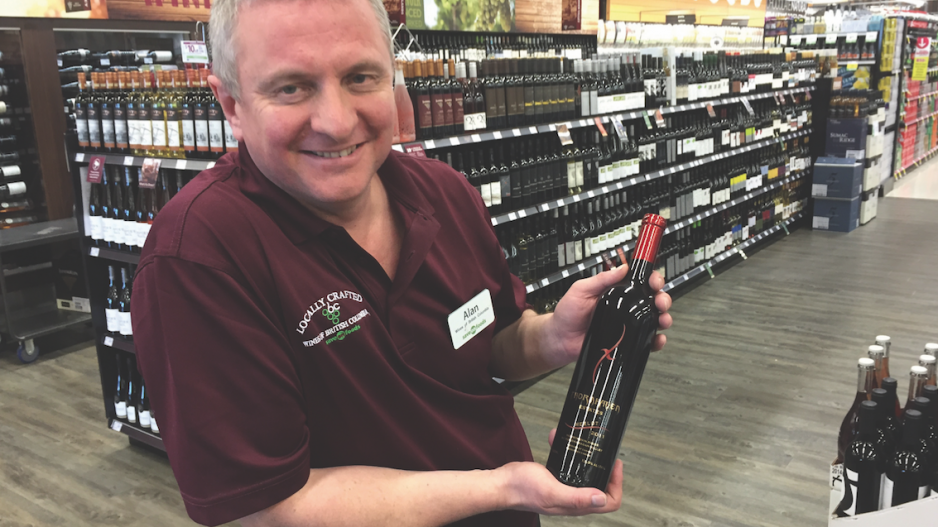At the Save-On-Foods supermarket in Tsawwassen, shopper Sherry Robbins picked up roast beef and buns for dinner and then, on her way to the checkout, casually directed her cart into the store’s feature attraction: a 1,500-square-foot wine section.
It was a novelty for her; she’s not at all familiar with wine, but she adapted quickly. She wanted only one bottle, but took two: one from the Okanagan and one from Salt Spring Island.
“This is wonderful. I love it, I love it,” she enthused as she browsed a selection from 150 B.C. wineries. “It’s user-friendly but classy.”
Robbins was enjoying the most controversial change in the suite of policy reforms introduced one year ago by the British Columbia government: wine sales in supermarkets. So far, there are only seven such supermarkets in B.C., all of them operated by Save-On-Foods. It plans to open another five, and the chain says it has options to open additional stores.
Save-On-Foods is transforming the way British Columbians purchase wine by displaying it as a complementary food item for shoppers who can load it into their carts along with the usual staples of meat, bread and vegetables.
Robbins’ reaction is not unusual, said Alan Dagg, team lead at the Tsawwassen store. Wine in grocery stores is receiving strong consumer approval, he said, particularly from women.
But there are mixed reviews as the province unfolds policy changes in the way wine is sold that many feel have not been properly thought through. Supermarkets appear to be the winners, but there could be losers too.
“I think you will see a decline in the number of of government liquor stores and the number of free-standing liquor stores,” said Mark Hicken, a Vancouver lawyer who specializes in wine policy.
He has looked at what happens in other jurisdictions where wine is sold in grocery stores. He said 65% to 70% of all retail wine sales eventually take place in supermarkets.
Already, Save-On-Foods is offering an inducement that private stores can’t match: discounts on items like meat or barbecue sauce for customers who also buy wine.
Part of Jim Pattison’s Overwaitea Food Group, Save-On-Foods was the first supermarket to act on the policy changes. Other supermarket chains are not far behind. Sobeys, which owns both Safeway and Thrifty Foods, is buying up private liquor store licences and has a proposal before the Liquor Control and Licensing Branch (LCLB) for a wine outlet in one of its Victoria Thrifty Foods supermarkets.
So far, wine in supermarkets has been a boon to the B.C. wine sector. Sales of wines carrying the Vintners Quality Alliance (VQA) designation – the only wines sold at Save-On-Foods – have climbed by 5% to 10% in the year since supermarket sales were introduced, said BC Wine Institute president Miles Prodan. The average bottle price is slightly higher in grocery stores than in non-grocery VQA outlets.
“It’s really a grocery-shopping experience,” Prodan said. “People are engaged in pairing food and wine, which is exactly what we wanted to have happen.”
Steve Moriarty, Overwaitea’s director of B.C. wines, said Save-On-Foods wants to enhance the food-wine experience for shoppers and to showcase the diversity of B.C. wine. Moriarty has sought wines from all VQA members.
Save-On-Foods entered the wine business by buying 12 of the 21 stores that sell VQA wines. It then signed a deal with the BC Wine Institute, owner of all 21 licences, to transfer them. The grocery chain agreed to sell wines produced only by the institute’s 152 VQA members. That accounts for about two-thirds of the province’s 250 wineries.
VQA licences are not the only way grocers can get into the business. The LCLB plans to issue 18 more licences in three tranches of six. The limited number and gradual release of the licences ensure that demand will be high. Bidding for the right to apply for the first six licences closed May 5 amid rumours of million-dollar bids.
Grocers can also buy private liquor stores, which are licensed to sell a range of alcohol products. These licences can be transferred to supermarkets under a government model that permits them to operate a store within a store.
In most cases, the expansion of wine in supermarkets is limited as many municipalities, including Vancouver, are not approving locations to sell wine if they are within one kilometre of an existing liquor store. In Vancouver alone, there are 70 existing liquor stores. Barring regulatory change – which Hicken expects to happen – almost all Vancouver-area supermarkets would need to buy out those nearby stores before they could open their own wine sections.
@BIVnews




